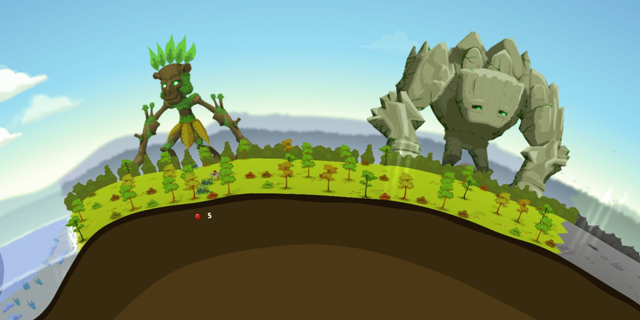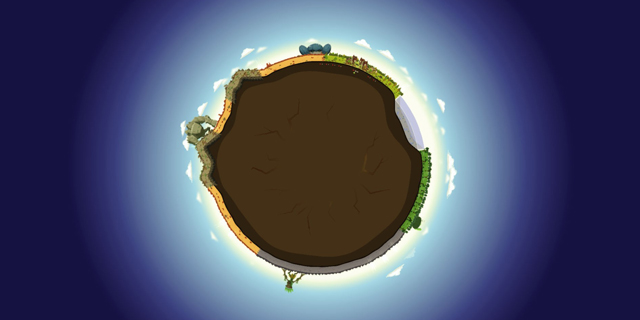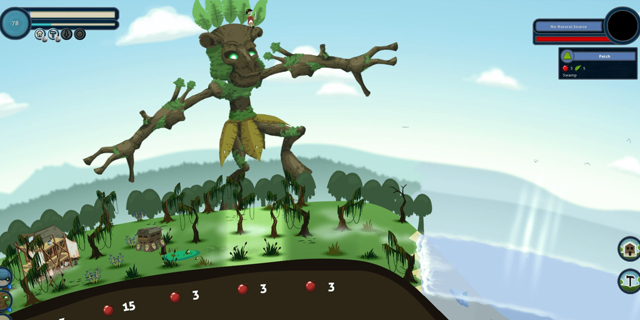
The strategy genre seems to be one of the more fertile grounds for innovation in all of gaming. Since its inception, designers have actively sought out all the varying avenues of possibility for manipulating virtual worlds. Different applications of systems, highlighting different motivations and tactics and endless variation on scenarios give the genre a wide breadth of potential. The newest example of experimentation in the genre comes to us in the form of Reus, a strategy game that prides itself in its creativity and bold design.
Reus is a role-reversed 4X (e.g. Civilization) strategy game. Instead of commanding individual units of your citizens to subdue the Earth around you in order to thrive, the player is put in the command of four giants who must reform and restructure the land to coerce its inhabitants to grow in ways that you choose. This creates a unique dynamic between the player and the world’s people, as you are now able to witness decisions from the perspective of a second party.

For example, in Reus, you must do what you can to keep war from breaking out between villages, something practically considered a necessity in other games of the genre. This abstraction from the norm forces the player to reconsider their role as a guardian force in the game, and how such power should be used to better the world as a whole. The game instills a sense of ownership and responsibility, and it really makes you feel guilty when you allow one village to become too greedy, forcing you to destroy it.
Reus takes place on a 2D plane of a large globe. You may move the four giants of the game independently around this space and create tile improvements where you see fit. This is where the other major theme of the game comes in: harmony and efficiency. Every tile enhancement can have its output improved by meeting certain criteria for surrounding tiles. For example, one of the earliest combinations you can access is placing a blueberry and a strawberry in adjacent tiles to increase the food output.

By forcing you to plan very far in advance in order to get the most productive combination of towns and tile combos, Reus asks you to think very carefully, as it is easy to paint yourself into a corner. As you effectively have agency over the entire planet, every action has many more long-term consequences than most 4X veterans are used to. While this system does require multiple playthroughs in order to remember the best combinations and prioritize the precious little allotted space, but when you are finally able to accomplish this, Reus becomes a rewarding experience that appeals the the obsessive-compulsive part of every gamer’s brain.
The 2D spritework is cartoonish and appealing in its simplicity. Reus seems to have drawn inspiration for its visual aesthetic from felt board compositions; the giants move in a very fluid, physics skeleton-esque manner and villagers take on charmingly basic likenesses of human beings to reinforce the gameplay abstraction between them and the towering, relatively detailed giants. As the game progresses, villages and tile improvements grow more impressive and interesting in design. A sufficiently-developed planet becomes a lovely sight to behold thanks to its colorful, busy, yet still not overwhelming architecture.
The musical score is calming, and allows the player to enter a more contented, almost trance-like state of mind, ideal for a long-haul strategy game. Once again, the simplistic audiovisual aesthetic necessitated by a more streamlined gameplay experience shows a good deal of design wisdom on the creators’ behalf, and I commend them for sticking to it.
If you need something to scratch your god game itch, and want a fresh take on the real-time strategy genre, then Reus is one of your best bets out there right now. It utilizes design choices that at once make the game more accessible and deeply complex, something that is especially difficult to do given the staple elements that define its genre. Plus, the game is a good value at $10; you could spend your money on much worse, or at the very least much less interesting, strategy games.
Pros: Innovative gameplay mechanics, charming visual aesthetic, approachable design
Cons: Combo system requires memorization and experimentation to use effectively



















